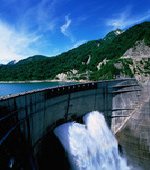 Call for applications: 2012 - European Summer School in Resources and Environmental Economics
Call for applications: 2012 - European Summer School in Resources and Environmental Economics
The 2012 Summer School will take place from the 1st to the 7th of July at the VIU campus on the Island of San Servolo, in Venice, located just in front of St. Mark's Square. The theme of this Summer School is Management of International Water.
Water flow patterns do not recognize political borders. Water utilization is associated with high dependency among users and may lead to negative externalities. As such international water management practices are hard to design and implement. Economic development leads to increased pollution, over pumping, and these in turn may lead to increased tension among states that share a given river basin. With about 40% of the river basins in the world being shared among two or more nations, together with the above-mentioned trends in water quantity and quality, international water increasingly becomes a public concern.
The Nile river basin, for example, is shared by 11 riparian states. It particularly attracted the attention of the world in the late 1990s when demands for water from African riparians, which previously did not make serious demands of the Nile, triggered international concern for possible instability in the region. Further, the mismanagement of the Aral Sea Basin, during Soviet times, has led to an environmental catastrophe and social disasters that the five basin republics have been facing since independence. After almost a decade and a half, and hundreds of millions of dollars spent, there are still many water management deficiencies attributed mainly to the international nature of the problem.
Issues affecting international water management are quite similar to those in domestic basins, except that the level of complexity is amplified due to the transboundary dimension of the resource. Therefore, additional disciplines and methodologies are necessary in addressing international water management. The most critical issues in international water management include (1) transboundary pollution, which can have direct and indirect regional externalities on humans and ecosystems; (2) water allocation among states and sectors, such as irrigation and hydropower, and/or navigation in some international basins; and (3) environmental and human rights aspects of water allocation.
Addressing these issues in the context of international water requires various disciplines such as negotiation theory, planning and economic analysis, institutional analysis, and game theory. Some of the disciplines interact to provide a better understanding of difficulties and opportunities in managing international water.
This summer school course intends to focus on several aspects of international water management that have been emerging form recent work in several disciplines. Issues to be addressed include negotiation, management models, regional development, global climate change, and transboundary pollution. The faculty of this summer school course will use both theory and various examples and case studies. The theory will be presented in the first part and the examples and applications will be included in the second part of each lecture. Through, economics, international relations, game theory, and modeling, the students will be exposed to the interdisciplinary nature of international water management.
|
| Contact information |
FEEM
(email: ess@feem.it) |
|---|---|
| News type | Nomination |
| File link |
http://www.feem-web.it/ess/ess12/01index.html |
| Source of information | FEEM |
| Keyword(s) | Management of International Water |
| Subject(s) | POLICY-WATER POLICY AND WATER MANAGEMENT , RIGHT |
| Relation | http://www.emwis.net/thematicdirs/events/2012/07/2012-european-summer-school-resources-and-environmental-economics |
| Geographical coverage | Italy |
| News date | 29/11/2011 |
| Working language(s) | ENGLISH |
 you are not logged in
you are not logged in





